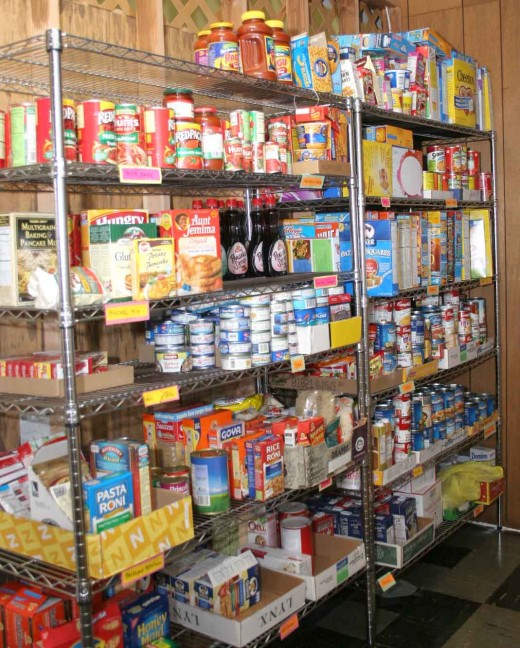Social and Economic Support in Stressful Times

Keeping Families from Falling through the Cracks
Since 2008 the US economy has been slowing rebounding. Unemployment rates have decreased from 7.3% in December 2008 to 5.6% in December 2014, according to the US Bureau of Labor Statistics. In July 2008, according to the US Department of Labor, the federal minimum wage was $5.85 per hour. By July 2009, that wage had risen to $7.25 per hour. Across the United States, minimum wages are being reviewed and in many cases, the minimum wage is rising substantially in an effort to push working Americans toward a more livable wage.
But for many families, having one or more full time jobs is not a guarantee of financial security. Many individuals and families still struggle to make ends meet on a daily basis. Many Americans, including 22% of children living in the US, live in poverty, meaning many go to bed hungry and otherwise lack some of life’s basic necessities. But with public benefits to low income persons being reduced or cut altogether, where can people in need turn for help?
Here are a few ideas:

Food Pantries
Food pantries exist in many communities. Some are stand-alone pantries that are supplied by local food banks, independent donors, farmers, etc., while others are affiliated with local churches or civic organizations. Hours may be limited, as is the amount of food that one has access to, but most pantries welcome persons with a self-declared need and very little, if any, supportive documentation. For most, verification of household income is not required. This is important, as households earning more than 185% of the federal poverty level are not eligible for Food Share (or SNAP) benefits. Access to most food pantries is granted to those having proof of address and a photo ID. Many only require the photo ID and access is granted based upon self-declaration of need. In many cases, the food pantries serve as a complement to SNAP benefits, allowing persons with limited SNAP benefits to purchase items such as dairy and meat, which are less plentiful at many pantries, and supplement those purchases with foods from the pantry.
Free and Reduced Lunch and Reduced School Fee Waivers
Reduced priced meals are available to children whose family income is at 185% of the FPL, which is the same as the eligibility for SNAP. Free lunch is offered to families with income at 130% of the FPL. If you receive SNAP benefits, inquire with your school Social Worker about enrolling your child(ren) in the free and reduced lunch program.
Keep in mind that when applying for SNAP benefits, your Case Worker will do a three-month look-back at your household finances to determine eligibility. If you have been denied but your circumstances change, it may be worth reapplying.

Community Gardens
Many communities offer public garden plots for a nominal fee to individuals or families that are able and willing to grow their own food. Food pantries in some communities may offer plots to their clients on a first come, first served basis, and issue seeds and gardening tools free of charge in exchange for teaching them the basics of growing and sustaining their own food source. The benefits of such programs include access for low income persons to healthy, organic foods at reasonable or no cost. Many garden programs also offer classes on cooking, canning and freezing their harvest for access to healthy produce year round.
Personal Essentials Pantries
Food Share (or SNAP) benefits do not cover items such as toiletries, paper products or household cleaning supplies. These items can account a significant percentage of a household’s monthly budget. Some communities have Personal Essentials Pantries that offer a limited supply of these items to persons or families in need. To inquire about whether your community has a personal essentials pantry, contact your local human service office.

Transportation
While gas prices fluctuate a few cents here and there, it appears that they will largely remain above $2 to $3 per gallon, making the cost of driving to and from low paying jobs prohibitive for many lower-wage workers. Some communities offer half price monthly passes for public transportation to SNAP recipients, elderly or disabled persons. Many also have carpool programs in which community vans pick up employees at designated locations and drive them to and from various work sites. A growing number of communities now offer free bicycle that are left in various spots throughout the city to be shared by citizens needin to get from point A to point B but lack personal transportation. Community Cars are also available in many eco-friendly communities. They are available to rent for a reasonable fee and often are more affordable than the cost of owning and maintaining a personal vehicle. These are especially convenient for self-employed, work-from-home individuals who may only need a car for business or personal use on an intermittent basis. Contact your local human services office or employer’s HR department to learn if such opportunities exist in your community.

Clothing
Clothing is not cheap. Especially for families with growing children. Many area food pantries or human service agencies offer new and gently used clothing free of charge to persons in need. Low cost clothing, accessories and footwear can be found at low prices through Goodwill and St. Vincent de Paul locations, but you may be surprised to find that there are also local agencies providing these items for free to low-income households. The items are made available through the generous donates of community members.
Goods and Services
Bartering and volunteerism are time-honored traditions of trading or sharing goods and services without relying on cash to get needs met. Many communities are beginning to rely on time banks in order to bring members together, capitalizing on their skills, interests, and abilities to strengthen the economic and social fabric of their community. Time banks work in various ways, some including a point system that can be exchanged for goods and services, and others, simply matching up skilled persons in need. For a more detailed look at how time banks work, or to start or join a time bank, visit www.timebanks.org.
Rate this Hub
© 2015 Jaynie2000





